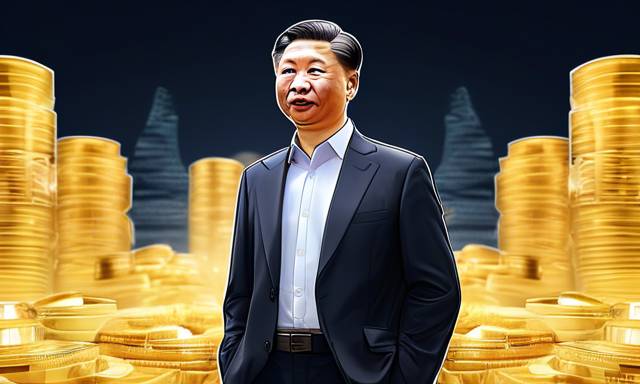What Does a Potential Shift in China’s Crypto Policy Mean for Investors?
Key Takeaways:
- Zhu Guangyao, a former Chinese finance minister, calls for a reevaluation of China’s crypto policies.
- The evolving global regulatory environment, notably the U.S. embracing crypto, may influence China’s approach.
- An essential shift from restrictive to more welcoming stances can potentially open new opportunities for investment.
- The rise of cryptocurrencies in BRICS nations may further impact global dynamics.
Let’s grab a cup of coffee and dive into the fascinating world of cryptocurrencies! You know, the crypto market is that exhilarating rollercoaster ride that everyone seems to be on—some thrilled, while others are screaming for dear life. Recently, at the 2024 Tsinghua PBC Chief Economist Forum, Zhu Guangyao, who served as China’s Vice Minister of Finance, stirred the pot by advocating for a fresh look at how China approaches the crypto industry. So, why is this crucial, and what does it mean for you as a potential investor? Let’s break it down!
A Policy Shift on the Horizon?
Now, Zhu didn’t shy away from acknowledging the risks associated with cryptocurrencies. He highlighted their potential to wreak havoc on capital markets, especially considering their often-volatile nature. However, what’s intriguing is his call for China to closely monitor global trends. This sentiment doesn’t just come out of the blue; it’s a reaction to a larger global narrative where digital currencies are gaining a foothold, particularly in the U.S.
For instance, Donald Trump—yes, that Donald Trump—is running his 2024 campaign on a platform that embraces cryptocurrencies. He’s signaling a clear message: “We better embrace cryptocurrencies, or else China will sweep the floor!” Imagine that—a former president advocating for crypto in the face of international competition! This political backing is enormous for the crypto market’s legitimacy and stability.
The Global Crypto Scene
Here’s where things get really interesting. Previously, the U.S. viewed cryptocurrencies with suspicion, often tying them to money laundering concerns and the like. Yet, this year has brought a notable policy shift. The U.S. Securities and Exchange Commission (SEC) has green-lighted multiple Bitcoin and Ethereum ETFs, showcasing a readiness to embrace these digital assets more wholeheartedly.
But it’s not just the U.S. making waves. Emerging economies, especially those in the BRICS nations like Russia, India, and Brazil, are also stepping up to the plate, looking to incorporate cryptocurrencies into their financial ecosystems. This collective movement can’t be overlooked because it signifies a broader acceptance of digital currencies as legitimate financial instruments.
China’s Historical Stance and Current Trends
Historically, China has been quite the strict parent to cryptocurrencies, holding a tight grip on their development. I mean, it all kicked off back in December 2013 when the People’s Bank of China prohibited banks from handling Bitcoin transactions—talk about a party pooper! Things ramped up in 2017 with a full ban on Initial Coin Offerings (ICOs) and a crackdown on crypto exchanges. Fast forward to 2021, and the situation escalated as the government declared all crypto-related transactions illegal.
However, there’s a plot twist! Hong Kong, a semi-autonomous region of China, has been more eager to welcome crypto with open arms. Under its “one country, two systems” policy, Hong Kong is establishing a regulatory environment that encourages crypto investments. This could be the silver lining; if Hong Kong gains traction as a crypto hub, it could inspire shifts in mainland China’s stance.
So, What Does This Mean for You?
As an individual looking to dip your toes into crypto investments, these developments present both opportunities and challenges. Here are a few practical tips:
-
Stay Informed: Keep an eye out for updates from China and other countries. As regulatory narratives change, so do investment opportunities.
-
Consider Diversifying: If you were to invest, think about diversifying your portfolio to include cryptocurrencies. It might feel risky, but where there’s risk, there’s often reward.
-
Engage with Community: Join forums and discussions to engage with other investors. Sharing insights and experiences can give you a real edge.
- Risk Management: Given the volatile nature of cryptocurrencies, it’s vital to invest only what you can afford to lose. Set stop-loss orders if trading, just to be safe.
Here’s my personal insight—cryptocurrencies are not just about trading and prices, they’re about innovation, financial freedom, and potential future transformations of our economies. However, they come with their fair share of risks, so balance will be key as you navigate this exciting landscape.
In Conclusion
The relationship between countries like China and cryptocurrencies might not be straightforward, but it’s evolving rapidly. China’s potential shift in policy could herald a new era for crypto—not only locally but globally.
So, I’m throwing this out there: as you ponder your crypto investment journey, consider this—what role do you think cryptocurrencies could play in the future economy? Is it just another trend, or could it redefine the fabric of finance as we know it? Reflect on that, and you might just find your next investment opportunity hiding in plain sight!





 By
By
 By
By
 By
By
 By
By
 By
By
 By
By